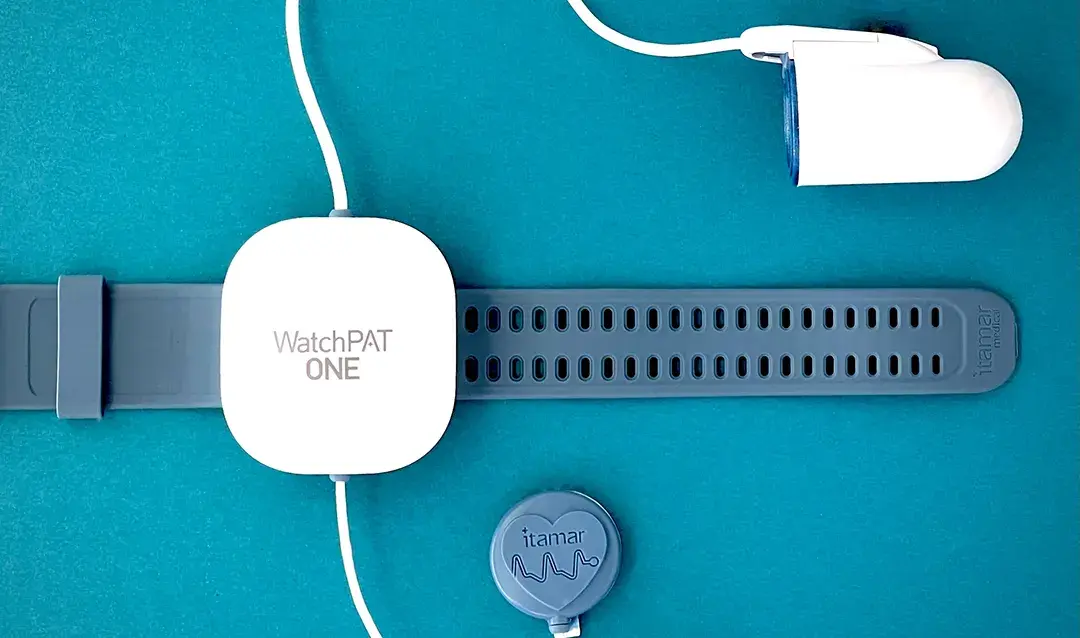When Should I Worry About My Partner's Snoring?
Learn the difference between harmless snoring and obstructive sleep apnea.

“My husband snores so loud that I can't sleep!"
As a sleep apnea clinician, I've heard this story and others like it countless times. As a partner, it's frustrating to be kept awake by the sound of a loved one sawing logs.
But there's more there, too. As the clock strikes 2:00am—after the third round of nudging your husband or wife to roll over—you may find yourself wondering, "should I be worried about this? Is snoring dangerous?"
Be assured, your concerns are valid. While acute snoring is sometimes harmless, it can be a warning sign of sleep apnea—a condition that, left untreated, can lead to serious downstream health issues.
Learn more: What is Sleep Apnea?
And when it comes to treating this serious condition, you play a vital role. Partner complaints are often the tipping point that prompt a patient to seek testing and treatment.
Where to Start Addressing Snoring Concerns
Not every case of loud snoring is a sign of sleep apnea. In some cases, snoring is simply annoying, but nothing more.
So that begs the question, how do you know the difference?
The simplest answer is to take a sleep assessment. This free, 5-minute quiz was designed with Complete Sleep’s board-certified sleep physician to identify the biggest warning signs of sleep apnea. You can ask your partner to take the assessment or even answer the questions on their behalf.
Start Here: Take a Sleep Assessment For Your Partner
Along with that important step, there’s more you can learn about concerns to watch for in a snoring partner—and what to do about it.
The Anatomy of Snoring
As our bodies enter the realm of dreams, our muscles let their guard down — a natural defense against acting out our fantasies. It’s normal that this relaxation narrows the airway to some degree. In some cases, though, that airway narrows too much. When that happens, similar to pinching a straw, there's less space available for air to flow through.
When air squeezes through the tight space of a relaxed airway during sleep, it creates the all-too-familiar sound of snoring. In essence, the sound you hear is a vibration. That seems innocent enough, right? But in clinical terms, we actually consider it a form of “sleep-disordered breathing.” This category encompasses both your garden-variety snoring (sometimes called acute snoring) and its more concerning cousin, sleep apnea.1
When Snoring Signals Sleep Apnea
Snoring and sleep apnea share a common root: airway relaxation. Clinically speaking, both are forms of “sleep-disordered breathing.” The difference comes down to the degree of breathing disruption and oxygen loss.
More specifically, an apnea is what happens when the airway becomes narrow enough to stop your breathing or make it shallow enough to cause a drop in oxygen. If this is happening frequently throughout the night, we call it “obstructive sleep apnea.” For snoring to be accompanied by a formal diagnosis of sleep apnea, it has to contain the following components:
The patient stops breathing for 10 seconds or longer while they’re asleep, at least 5 times per hour. These episodes are sometimes called “apneic events.”
These breathing disturbances come with a 3-4% drop in oxygen levels.
“But if my partner actually stopped breathing in their sleep, I would know that, right?” Not necessarily. Sleep apnea can’t be diagnosed by sound or observation alone.
Even so, snoring sounds are a helpful red flag—particularly if they’re loud and consistent. Audible gasping, choking sounds, and visible breathing pauses are other tell-tale signs.
Related: What’s the difference between “just snoring” and sleep apnea?
The Less Obvious Signs of Sleep Apnea
Beyond straightforward signals like loud snoring or audible gasping sounds, certain less obvious clues may signal a bigger issue. Pay particular attention if your partner experiences:
Excessive daytime tiredness
Confusion, forgetfulness, or brain fog
Diabetes
Irregular heart rhythms
A history of smoking or nighttime drinking
When Occasional Snoring Might Still Be an Issue
"What if my partner snores, but only sometimes?" Occasionally, factors like seasonal allergies, sinus issues or alcohol can temporarily heighten snoring, even causing occasional apneas.
Respiratory congestion from illness, for example, narrows the airway and can lead to snoring—but it may go away once the infection clears. Alcohol makes airway relaxation worse, but only temporarily, which may not be concerning if your partner has alcohol close to bedtime only on occasion.
That said, when sporadic snoring pairs with other risk factors, we still recommend an evaluation.
Talking to Your Partner About Sleep Apnea
Remember, sleep apnea is more than an inconvenience; it's a cascade that can unleash a torrent of health issues, from obesity to heart disease.
So if you suspect sleep apnea, your concerns are valid—and worth bringing up.
Learn More: How to Talk to Your Partner about Sleep Apnea
Admittedly, talking to your partner about their snoring can be a tricky subject. After all, they aren’t hearing the concerning sounds that you do at night. They’re asleep!
So, how do you get the conversation started?
Consider broaching the topic gently.
You’ve probably told them in the past that they snore, but you can ask broader questions like, “Have you been tired recently?” or “Have you been having a hard time focusing?” Take a moment to listen, think about what they’re saying, and reflect what they’re saying back to them.
At this point, you can share what you’ve learned about sleep apnea. Let them know it’s a serious condition3 and see if they’re interested in taking a sleep assessment.
How to Help Your Partner Get Tested and Treated
To get the truth behind your partner’s snoring, they need an overnight sleep test. Fortunately, sleep apnea tests are much easier than they used to be. Your partner can complete the test at home in the comfort of their own bed!
This easy-to-use at home test gives your sleep physician critical details about breathing disturbances and oxygen levels throughout the night, which are critical elements of an accurate diagnosis.
It can also be helpful to know that when it comes to treatment, you and your partner have options. Sleep apnea treatment has advanced considerably in recent years, so a CPAP isn't the only available solution. Learning about treatment options will make the prospect of addressing sleep apnea less scary for your partner and for you.
Learn More: What are my options for treating sleep apnea?
Memon J, Manganaro SN. Obstructive Sleep-Disordered Breathing. [Updated 2023 Aug 8]. In: StatPearls [Internet]. Treasure Island (FL): StatPearls Publishing; 2024 Jan-. Available from: https://www.ncbi.nlm.nih.gov/books/NBK441909/
Walia HK. Beyond heart health: Consequences of obstructive sleep apnea. Cleveland Clinic Journal of Medicine. 2019;86(9 suppl 1):19-25. doi:10.3949/ccjm.86.s1.04. Available from: https://www.ccjm.org/content/86/9_suppl_1/19
Slowik JM, Sankari A, Collen JF. Obstructive Sleep Apnea. [Updated 2022 Dec 11]. In: StatPearls [Internet]. Treasure Island (FL): StatPearls Publishing; 2024 Jan-. Available from: https://www.ncbi.nlm.nih.gov/books/NBK459252/




